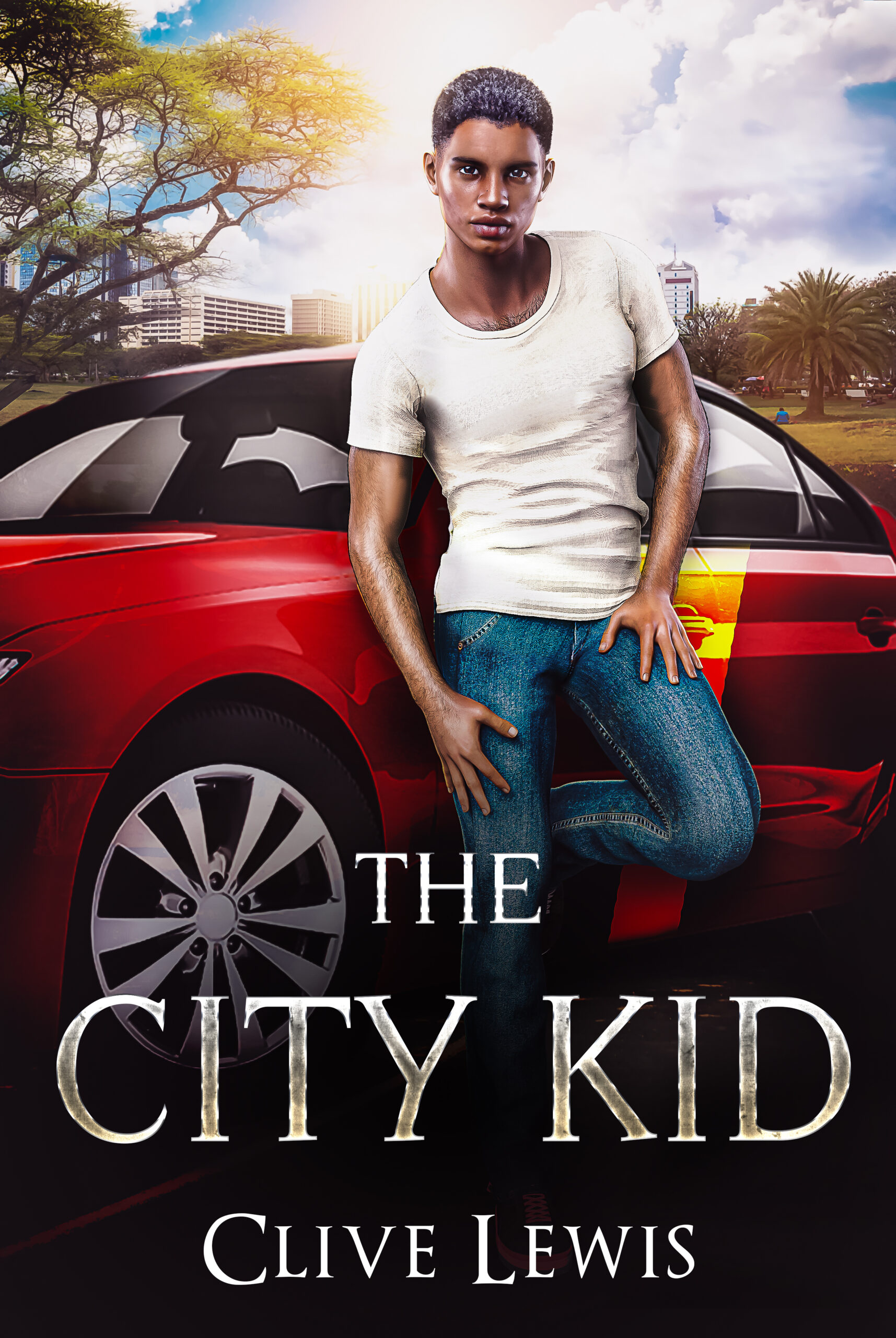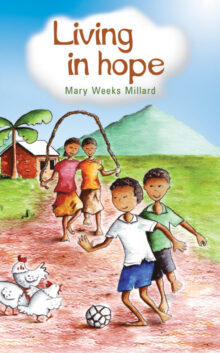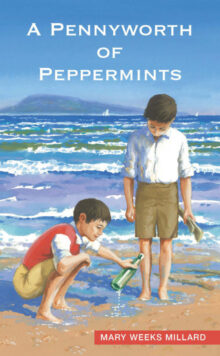Description
ONE
Escape From The Village
“Independence!”
The word itself seemed to have the magic of a spell conjuring up a brilliant future. John Ouma spoke the word aloud and the syllables sounded sweet in his ears. He wasn’t thinking of his country’s Independence Day, due to be celebrated later in the month; this was something far more personal.
“My independence,” he whispered to himself, as he strolled down the narrow main street of his village, keeping to the shade of the acacia trees that edged the murram track. He began whistling softly between his teeth. Today was a day to savour: the day he had received the results of his A Level examinations – three good passes with an A grade in maths. It was what he needed to fulfil his ambitions.
He stopped at the local store where one could buy the basics of life – millet flour, maize, beans, fresh fruit such as oranges and mangoes, soap, washing powder and a few extras. The owner was dozing in a chair by the doorway.
“Eh, Mr Okot!” John called. “You have a customer.”
The seated figure looked up, blinked in the bright sunlight and cleared his throat. “Who’s that? Eh, it’s young John Ouma. How are you, John?”
“I am fine, Mr Okot, and I am not so young: I was 19 last month.”
“But you are still a schoolboy.”
“Not so. I have finished with school, finished for good. And today I am in a mood of celebration. I have passed my exams – with flying colours!”
“Congratulations, John. You know, you have become the pride of the village – doing so well at secondary school.” He reached out to grasp John’s hand and shook it vigorously. “So how are you going to celebrate?”
“Not yet decided. Meantime, I think I shall have one of your Impala beers.”
The shopkeeper rose slowly to his feet and made his way to the large refrigerator at the back of the one-roomed shop. “The power has been off. You’ll have to drink it warm,” he called.
“OK, forget it. I’ll come back when the power is on.” Leaving the shop, John allowed his gaze to scan the familiar scene before him. The main street was a rutted, red earth road, flanked by a scatter of single-storey buildings, including one that sold mobile phone accessories. Even here, thought John, even in this run-down village of Mkandu, the modern world has managed to make an appearance.
Despite the presence of this shop, Mkandu presented, in John’s mind, a depressing picture: progress and development had largely passed by this place. It was like being on another planet compared to the buzz and excitement of Kamobi, the capital city. The village was in a time warp, stuck in the middle of the twentieth century – or perhaps an earlier time when the British ruled the country, dependent on subsistence agriculture and lacking any prospects for young people with ambition. Even the road, with its trickle of traffic, led to nowhere important. The village seemed like a dusty dead end.
On the other side of the road, behind a screen of mvule trees, John could see the long classroom block of the local primary school and the uneven, grassless football pitch where he had so often played in the past. The school building was beginning to crumble and the corrugated iron roof was rusted with age. Close by was the local chief’s compound, the only building in the area that had a tiled roof. Beyond that John could make out a small cluster of circular thatched huts, shimmering in the late afternoon heat. My home, thought John – my home for all 19 years of my life.
It seemed amazing to John that he had spent so much of his life in that small compound, treading the same pathways, sheltering under the same mango tree, sleeping in the same cramped hut which he shared with his younger brothers. Going away to boarding school for his secondary education had given him a taste of independence, and now, with three good A Level passes under his belt, he felt ready for a complete break from the restrictions of village life.
John said goodbye to Mr Okot, the shopkeeper, and wandered across the road to the Mobile Phone shop, which sold lottery tickets as well as phone accessories. One side of the building had been painted in the vivid green-and-purple colours of Mob-Tel, one of the main telephone networks in the country, and the front had a banner stretched across the wall above a solitary window, announcing the company’s slogan: “Join the Crowd. Join Mob-Tel.” Next to the slogan was an image of smiling African faces, all young and lively, obviously enjoying life. Such an image seemed strangely out of place in this village, thought John, but even the older generation had learnt the value of mobile phones. Even his mother, who had never progressed beyond the third year at primary school and who spoke no English, loved her mobile phone.
Peering through the open door into a haze of cigarette smoke, John greeted the middle-aged man behind the counter. “Hi! How’s business?” The man snorted in response: “Business? In this place? It’s like trying to revive a dead body! I’m leaving at the end of the month – let someone else waste his time here.”
John smiled in sympathy. “You’re not the only one leaving here.”
“Who else is going?”
“Me of course! I’m heading for the bright city lights of Kamobi!”
“Good for you – although I wonder how you’ll make a living there. Kamobi is bursting at the seams with people from the country trying to find work.”
John couldn’t stop himself grinning with delight. “I don’t have to find it. I’ve got a job lined up. All I needed was some good A Level grades.” He fished in his back pocket for a carefully folded document, which he waved briefly in front of the shopkeeper. “And this piece of paper, from the examinations board, is my passport to success!”
The man behind the counter rubbed his chin thoughtfully and tried to sound pleased for John, but his tone hinted at a note of envy. “Good luck to you – but you young people have things easy compared to my days. When I was growing up . . .”
“Ah, yes,” interrupted John cheekily, “but that was a long time ago.”
“Not so long ago, young fellow.”
“Anyway,” replied John, “let me have a Mob-Tel top-up voucher for my phone.”
“How much?”
“Just 20. Can’t afford any more at the moment.”
The shopkeeper extracted a card from a wad in the drawer under the counter. John paid for the voucher and quickly left the shop, glad to escape its smoky atmosphere.
Once again John found himself scanning the all-too-familiar surroundings and reflecting on the possibilities that lay ahead. His early childhood had seemed a very contented period of his life, but education at a boarding secondary school, far from his home area, had changed his perspective. Living, for months a time, with young people from all over the country, many of whom did not speak his native language, had widened his horizons.
He had come to regard his village and its surroundings as backward and lacking a future. The ethic of personal ambition and achievement had gradually won over John’s mind; he became determined to make a clean break from everything which might limit his freedom to lead a successful life. Even his parents, who had struggled to afford his school fees, were now seen as part of an old life that he had to leave behind. They had sweated most of their lives raising sufficient crops on their small area of land in order to feed their family and buy the necessities of life. John had no intention of joining them in that struggle, although he was grateful for their hard work, which had enabled him to study beyond primary school.
His attention was arrested by the sight of a minibus taxi bumping down the street and coming to a stop not far from where he was standing. Taxis usually bypassed the road through Mkandu village and people often had to walk from the main road two kilometres away. The passenger door slid back and three people got out, paying their fare to the conductor as they did so. One of the figures looked rather familiar to John, but he couldn’t be sure until he had walked away from the vehicle. Then John recognised the young man and called out, “Zeke! Zeke Ochieng!”
A look of amazement crossed the other’s face as he looked in the direction of the shout. Then he called out, “Is that John Ouma? It is – hey, John, what are you doing here?”
They shook hands warmly and grinned in mutual recognition. “For your information, Zeke,” said John, finally responding to the other’s question, “I happen to live in this village that time forgot. More to the point, what are you doing here?”
“I’ve got a widowed aunt who lives here – and I’ve been sent with some medicine for her. You know Mrs Alit?”
“Not well. She lives some way over there.” John pointed vaguely along the road to where an overgrown track led to a disused stone quarry. “Have you got your exam results, Zeke?”
“Yes, and I got the grades I needed.”
“Well done – and remind me: what are your plans?”
“I want to teach, John. So I’m off to Kamobi Teachers’ College in a few weeks’ time.”
John looked at his friend with an expression of exaggerated sympathy. “Well, you know what they say about the teaching profession?”
“No – but you might as well tell me.” Zeke was accustomed to John’s witty or sarcastic remarks, because they had been at the same secondary school during their A Level studies.
“The saying goes: Those who can, do. But those who can’t, teach.”
“OK, John. Thanks for your support! So what about you? You got the grades you wanted?”
“I did – especially maths. Here’s the evidence.” Once again John fished in his pocket and brought out the now crumpled document.
Zeke glanced at it briefly, eyes widening at the high grades. He knew that John had not been the most hard-working of students but somehow he had the ability to focus when it mattered; in the run-up to exams. The document gave ample evidence of this. “Congrats on your results, John. So you’re going to uni next year?”
“University? You must be joking, my friend. No. I am starting a job next month and will soon be earning a salary.”
“What? Here in Mkandu?”
“Ha ha, very funny. Who on earth is going to give me a job in this place? Unless it’s digging with a hoe! No, I’m off to Kamobi to work in the Ministry of Technology and Development.”
John whistled in genuine admiration. “Wow! How did you manage that?”
“Well, I needed good grades in maths and science. I’ll be working in the finance department – you know, accounts and that sort of thing.”
“Getting high grades in your A Levels isn’t usually enough to get a job straight from school.” Zeke looked at John doubtfully.
“To tell the truth, Zeke,” replied his friend after a long pause, during which he seemed to be deciding what to say, “a certain uncle of mine works in the Ministry of Technology and he . . .”
“. . . he pulled one or two strings for you?”
“You could say that.”
Zeke was frowning. He knew such things commonly happened but he felt uncomfortable standing next to someone who was openly admitting to the practice.
John, however, seemed unembarrassed by his confession. After a few moments, he continued, “But, you should know, nobody is going to be pulling the strings of my life. My ambition is to aim for the top – and I believe it’s up to me to get there.”
“Well, you know what they say: there’s a lovely view at the top but, if you fall off, you’ll hit the bottom very hard!”
At this point, the two young men, who had been ambling aimlessly along the side of the road, reached the shade of a large mango tree. Here they paused and John turned to his school-mate with a note of irritation. “Now, listen Zeke – or should I address you as Bishop Zeke? – you are slipping into your preaching style and I find that a bit annoying. All your efforts to make me join the Scripture Union group at school were a total waste of time, as you know well.”
“That’s true,” Zeke replied, rather sadly.
“What you fail to understand is this: I don’t want to be bossed by anybody in my life – whether it’s God or a teacher or anyone else.”
“But being a Christian isn’t like being bossed around . . .”
“Zeke,” said John, ignoring the other’s words. “I have just had a brilliant idea!”
Zeke sighed; he could tell from his friend’s tone that some sort of witty remark was coming. “OK, John, what is it?”
“I have decided to re-name this village. From now on it is to be called, not Mkandu, but Me-Can-Do. Get it? Me Can Do. In other words, if I set my mind to anything, I can do it.”
Ezekiel Ochieng reflected on his friend’s words; he knew there was some truth in them. John had always been a strong presence in the Sixth Form at Luboga Boys’ College, and he seemed to have a method of getting his own way . . . especially with the girls at the neighbouring school. Even the teachers appeared to recognise his gift of leadership and, despite the rebellious streak in him, he had been appointed Deputy Head Boy, as well as the school’s Entertainments Secretary.
Zeke hadn’t been in John’s closest circle of friends, although they had studied the same subjects at A Level and had shared many lively conversations on the subject of religion. John couldn’t understand Zeke’s devotion to his Christian faith, even when his friend had tried to explain the difference between religious observance and living faith. He also wondered if this “living faith” would last into adulthood. Even so, he respected Zeke’s sincerity – he could see there was no pretence or hypocrisy in it. He also admired his friend’s musical skills. Secretly, John was more than a little jealous of Zeke’s guitar-playing.
At one corner of the football field was a large earth mound, long since abandoned by the termites that once occupied it. The top had been cut off to make a seat, conveniently situated beneath the rich shade of a flamboyant tree. The twitter of sunbirds could be heard among the red blossom of the tree. “Let’s sit down over here,” suggested Zeke. “Unless you’re in a hurry?”
“Not me,” replied John. “I am in a lazy, celebratory mood. Except for the fact that the power is off and I can’t get myself a cold beer.”
“Sorry to hear that,” said Zeke, with a hint of sarcasm.
The two made their way to the seat and sat down. On the other side of the field, the primary classrooms were full of children in their blue uniforms. Teachers’ voices were wafting across the field on the breeze.
“No more school, Zeke. No more being told what to do. No more being in a herd, like animals . . .you sure you want to be a teacher?”
His friend laughed. “You sure you want to be on that slippery slope of power and success?”
“I don’t intend to slip down any slope. As for power and success . . . yeah, why not?
“And what about your mum and dad? How do they feel about you disappearing into the big bad city?”
John smiled. “They are really happy for me! They were so proud when I got my results. You should have seen my mother – rushing round the compound, waving my results sheet above her head, shouting to the neighbours about her eldest son’s marvellous deeds!”
“Mothers always seem to have the softest spot for their eldest sons. As for me, I’m the fifth out of six kids – so I don’t get special treatment!”
“Too bad, Zeke. Anyway, I’m looking forward to getting my first pay packet and sending some money home each month. It’ll feel good to be contributing a bit, even though I wouldn’t want to live the rest of my life in this place.”
At that moment Zeke’s attention was distracted and he raised his right hand to cup his ear. A familiar song playing on the radio in a nearby homestead had been picked up by the breeze and blown to where the boys were sitting. “Can you hear that song, John?”
The sound of a rap beat came and went with the irregular movement of the air. The words could not be distinguished but both young men smiled in recognition. “That’s the Bobby Kweli Rappers. You like that music, Zeke? I thought Christians didn’t approve of rap or hip-hop.”
“Depends on the words, John. I think that song is really cool. Did you know I once sang it at the Scripture Union group?”
“No, I’ve never heard you play rap!” The rhythmic thump of the music continued to filter through to their ears. Finally, John asked, “OK, so what’s so cool about the words of this song?”
“Shall I quote?”
“Yeah, go on if you must.”
“Let’s see if I can remember.” Zeke paused and then, snapping his finger to create a regular beat, rapped out the lines from the song:
You think that with your modern clothes and the way you can dance,
With your mini-skirted girlfriends – that life’s a game of chance.
You think that popularity will get you anywhere,
And you think that when your pocket’s full of money
Then you’ll never have a care!
John found himself tapping his feet and nodding his head to the rhythm. “Is that all there is?” he queried.
“No, there’s another bit I can recall. It comes right at the end of the song.”
You think that fame and fortune will lead to paradise,
But the more you get, the more you want – it never satisfies.
You can gain the whole wide world, my friend, and lose your very soul;
And when you die what do you get?
A coffin and a small rectangular hole!
John was chuckling loudly. He wagged his index finger at Zeke like a teacher rebuking a pupil. “I see what you are doing, Bishop Ochieng! You are trying to sneak in a sermon without me noticing. But you see, I don’t see why I should be ashamed of those things. Why shouldn’t I improve my standard of living? Is it wrong to gain fame and a fortune? I don’t think so. What do you think that song is saying, that earning a lot of money is a crime?”
“Of course not, John. I think the song is saying that money, fame, fortune, popularity – they’re not necessarily bad, but all that stuff shouldn’t come first.”
“I agree with that, Zeke. I think girls should come first – but unfortunately you need money to get the girls, so they have to come second after the money!”
Zeke stood up, annoyed by his friend’s dismissive attitude. “And what about the last lines of the rap? About gaining the whole world and losing your soul?”
John also stood up and looked Zeke full in the face. “You are free to get your satisfaction from prayer and the Bible and going to church – and even singing rap songs. But, for myself, I’ll be finding my satisfaction elsewhere.”
“And what about the coffin and the grave?”
“Well, Zeke, they are a long, long way off. Maybe, when I am on my last legs and about to pop off, I will do a bit of repenting – just to make sure it’s not too hot on the other side.”
“It’s not like that, John. Getting right with God isn’t a button that you can press when convenient.” Zeke could sense that the conversation was not going anywhere; John’s comments were becoming flippant. In any case, he knew that he had to visit his aunt with the medicine and get back to his home, 35 kilometres away, before the taxis stopped running on the main road, around ten o’clock at night. He needed to get a move on.
“I must go, John,” said Zeke, indicating the bag he was holding. “It’s been great seeing you again. We may meet in Kamobi one of these days.”
“Probably not, Zeke. I don’t suppose we’ll be going to the same places in the city.” John grinned mischievously. “Unless you’re planning to visit the night clubs there. You could bring your Bible and preach to us sinners!”
“That’s an interesting idea, John. I’ll have to give it some thought.”
The two young men shook hands and said their farewells. Zeke strode away towards his aunt’s home, shaking his head and wondering if he would ever see John again. John turned back to the village store, having decided that warm beer was better than waiting indefinitely for the power to be restored to the village.







Reviews
There are no reviews yet.